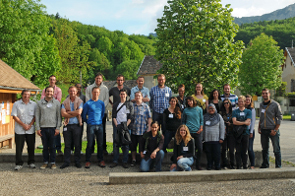
Actualites

The 22 nd European Junior Scientists Workshop on “Monitoring urban drainage systems” was held in Chichilianne, France, on 18-22 May 2015. It was proposed by the international Working Group on Sewer Systems and Processes (SSPWG) of the IWA/IAHR 1 Joint Committee on Urban Drainage (see www.jcud.org).
21 junior participants from 9 countries and 12 nationalities from all regions of the world and four senior organisers met in Chichilianne, a small picturesque village in the French Alps, 45 min south of the city of Grenoble. Chichilianne is a well-known tourist location, not only because of the remarkable cliffy table mountain Mont Aiguille. The Vercors plateau with wonderful panoramas and history landmarks, endemic species of orchids and wild life are also exceptional in Chichilianne. The workshop was warmly welcomed by the mayor, the technical staff of the village and the managers of the Gîte du Mont Aiguille (the workshop venue). Working sessions were organised in both the city hall meeting room made freely accessible by the municipality and in the gîte main room.
Junior participants were PhD students, post-doc researchers and young water professionals. As in previous EJSWs, they made oral presentations of their research during morning sessions, including objectives, methods and results, followed by questions and answers. Presentations were generally of very high quality and led to interesting discussions. The workshop theme “Monitoring urban drainage systems” was the common topic for a great diversity of research works, including monitoring and measurements of water level, flow rate, water quality, suspended solids, nutrients, micropollutants and pharmaceutical residues, sediments in gully pots, pumping stations, rainfall, urban green areas and biofilms, by means of sampling campaigns, on line sensors, radars and biosensors used in sewer systems, waste water treatment plants and surface waters. This workshop offered, for the first time in the EJSW series, a new type of sessions: hands-on field work afternoon sessions.
The workshops organisers gave introductory short courses on e.g. sensors’ technologies, sampling campaigns and representativeness, design of monitoring stations, sensor calibration and uncertainty assessment. The participants were then involved in practical and field work applications organised in parallel small groups. Sensor calibration was carried out in the gîte. The municipal waste water treatment wetland, kindly open for the workshop participants, was the place for an experimental sampling campaign for analyses of total suspended solids, and for a continuous on-line monitoring of water temperature and turbidity (photos 1 and 2).


The nearby small rivers and karstic area were used as a case study to design monitoring stations. These hands-on afternoon sessions were highly appreciated by the participants. Involvement of the workshop organisers in field work together with the junior participants contributed to the very friendly and collaborative atmosphere of the event.
At the end of the workshop, a special interactive session was devoted to ethics in research, which was a great opportunity to discuss issues of growing importance based on cases and experiences brought by all participants.
In addition, food quality in the gîte and recreational activities (ascent to and hiking in the Vercors plateau (photo 3), orchids discovery tour, and lastly taste of local food and drinks produced with wild vegetables, fruits and flowers by two mountain guides) were also key parts of this workshop (photo 4).
The welcome by municipality and gîte managers greatly contributed to the success of the event. This is why the organisers envisage organising a second edition of this workshop in May 2017, again in Chichilianne, with improvements and new ideas based on this first experience.


Jean-Luc Bertrand-Krajewski (INSA Lyon; France), Frank Blumensaat (ETH & EAWAG, Switzerland), Francois Clemens and Mathieu Lepot (TU Delft, The Netherlands).
Acknowledgements: the 22 nd EJSW was partly funded by INSA Lyon and ETH Zürich with Endress-Hauser.
IWA – International Water Association (www.iwa-network.org) and IAHR – International Association for Hydro-
Environment Engineering and Research (www.iahr.net).